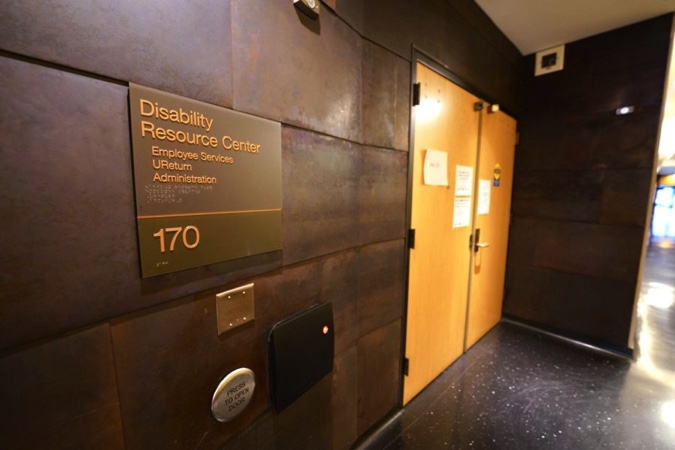A handful of student protestors lined the sidewalk in front of First Care Pregnancy Center in Prospect Park in late April. One of their signs proclaimed that the clinic behind them was a “fake center.”
The University of Minnesota students turned out to caution others against visiting pregnancy centers they view as illegitimate. Not all services offered at women’s healthcare clinics are the same, especially near the University’s Twin Cities campus, where 1.5 percent of students have reported “being involved in a pregnancy,” according to a 2018 survey by Boynton Health. About one-third of those pregnancies resulted in an abortion. While a handful of abortion providers remain in the state, abortion rights advocates are raising the alarm on pregnancy centers they say are spreading misinformation about abortion.
The University’s on-campus medical clinic, Boynton Health, like other university-based clinics in the Midwest, does not perform abortions. Only five abortion clinics exist in Minnesota, with Planned Parenthood in St. Paul being the closest provider to campus.
For a student seeking an abortion, Women’s Health at Boynton would refer them to an abortion provider in the area, said Ann Laros, assistant director of primary care at Boynton’s Women’s Health division. As for pregnancy centers, Laros said she has limited knowledge of those in the campus area.
“In general, I would hope that my team, if you’re going to refer somebody, would refer somebody with a full understanding of the services that they provide,” said Laros.
According to the National Association for the Repeal of Abortion Laws Pro-Choice Minnesota (NARAL), an abortion rights advocacy group, there are over 90 “fake” women’s health centers in the state, outnumbering abortion providers about 19 to 1. NARAL argues that certain types of clinics should fall under that category because they do not provide clients with “all their options” when they are pregnant.
First Care Pregnancy Center and Abria Pregnancy Resources, two clinics located near the University, do not perform abortions, though they advertise resources for those who are pregnant.
Abria and First Care are what abortion rights organizations have branded as “crisis pregnancy centers,” places where women can go if they face an unexpected pregnancy. These types of clinics have come under fire by abortion rights organizations for trying to dissuade women from getting an abortion and perpetuating misinformation. Many say they’re not upfront with their anti-abortion ideology, despite advertising as a pregnancy resource.
“They’re a manifestation of the anti-choice movement,” said Haley O’Neill, a NARAL organizer who oversees state college chapters affiliated with the organization.
But student supporters of the clinics say they don’t take sides.
Nick Johnson, president of Abria on Campus, said the clinic will not tell a client what to do.
“What they will offer to that woman is education surrounding what an abortion entails,” Johnson said.
Abortion rights activists question clinic transparency
The debate about where someone struggling with an unexpected pregnancy should go for care has led to clashing narratives about which organizations are trustworthy.
Abortion rights advocates say many clinics are not open with their views on abortion because they want to discourage clients from the procedure. However, pregnancy centers near the University say they give information about abortion by the book.
“People have a right to know real options, especially when it comes to healthcare and reproductive rights,” said Molly Lancrete, co-chair of the student group University Pro-Choice Coalition. The UPCC organized the protest outside of First Care in April. “All of these clinics, their goal is to persuade their patients not to get an abortion,” Lacrete said.
In 2012, the state’s NARAL chapter surveyed 15 pregnancy centers and found that nearly all of them provided some false information, such as linking abortion to the risk of breast cancer.
Lancrete said she thinks many centers offer vague information about abortion to get people to schedule an initial appointment.
“It’s the luring tactics, it’s the manipulation and the deception. That is what needs to stop,” said Lancrete, who said she hasn’t visited a pregnancy center near campus but has been informed by NARAL’s research.
First Care and Abria state on their websites that they do not provide abortion services or referrals for abortions.

Tammy Kocher, executive director of New Life Family Services, which operates First Care centers across the state, said the clinic is transparent in its decision to not provide abortions.
“We are a life-affirming organization and do not provide abortion services and we are up front about this,” Kocher said in an email to the Minnesota Daily.
Both clinics say their information about abortions comes from the Minnesota Department of Health, the same information abortion clinics are required to provide by law. Abria’s two locations in the state received $226,998 from a Department of Health grant for 2016-19.
“Each woman who comes to us meets with a client advocate who offers information about the full spectrum of options, including abortion, adoption and parenting,” said Cindy Koeppl, executive director of Abria, in an email to the Minnesota Daily. “We believe each woman should have all the information about the choices before her so she can be empowered to make the right decision for her.”
Amanda Salmon, client care supervisor at First Care, said when a client is facing an unexpected pregnancy, counselors will ask questions and help clients process information, but they will not pressure them to make a decision.
“I don’t think it’s good to make any major life decision when you’re in shock or a very emotional state. So we just kind of talk them through, you know, give yourself some time,” Salmon said.
Debate on campus
With two pregnancy centers near campus and an abortion provider right off the light rail, student groups representing both sides of the debate have organized to inform others about medical resources close to them.
Pregnancy centers are often located near universities, advertising their services to students via posters and tabling events, said O’Neill, who helps student groups organize around abortion rights policies. In 2011, the University Pro-Choice Coalition urged the Minnesota Daily to include a disclaimer in its advertisements for First Care, and with the help of NARAL, encourages students to stay away from the clinics.
“I think at their heart they do believe that they’re helping and supporting people and people are entitled to their own individual beliefs,” O’Neill said. “Well, [what] we have a problem with [is] … it’s not okay to coerce and deceive people as a means to further your beliefs because it’s not your reality. It’s not the life you’re living. It’s their reality and their right.”
Tessa Lynch, University first-year and president of the student group First Care on Campus, said the group’s mission is to educate students about the services First Care offers. Lynch said she can see how the clinic could be controversial on first glance, but that it does not take political sides.
First Care on Campus held its first tabling event of the semester in mid-April. They encouraged students to come in for free sexually transmitted diseases screenings and other services like no-cost pregnancy testing, ultrasounds and post-abortion support. Lynch said that the center’s most popular service is STD testing.
“I think pro-choice groups would be in huge support [of the clinic], [because] who doesn’t love free STD testing? And who doesn’t love a clinic that literally offers all free services, regardless of any insurance, regardless of financial status?” Lynch said.
Johnson, who is also the president of Students for Human Life at the University, said he could never support an organization that performs abortions. But he said he supports Abria as the president of the clinic’s student group because it provides the University community with valuable resources.
“The reason why Abria is the name that’s on the top of my list is mostly because [of] its proximity to the University of Minnesota,” Johnson said.
Just as not all women’s health clinics are the same, neither are pregnancy centers. Olivia Krenz, who recently graduated from the University of Minnesota-Duluth, tested NARAL’s research about clinic transparency for herself when she went “undercover” at a local center in 2016.
She said NARAL provided students like herself with urine samples that would test positive for pregnancy to investigate how the clinics would respond. Krenz then went to the Women’s Care Center, a pregnancy center in Duluth, for an appointment, where she received a pregnancy test, abortion counseling and an ultrasound.
Krenz wrote an essay about her experience which was published in the Duluth campus’s student newspaper, The Bark, formerly The Statesman.
Today, Krenz said she sees some parts of her “secret shopper” work as ethically dubious. But she said she doesn’t regret doing the work because it helped inform other young women about her experience at the Women’s Care Center.
“I would have felt better about it as a journalist had I not used the pregnant urine, because to me, that was really misleading for them. It was sort of setting them up for failure,” Krenz said.
The Women’s Care Center said it would not comment without knowing the client’s name. The Minnesota Daily did not have Krenz’s permission to identify her to the clinic before publication.
Andrea Ledger, executive director of NARAL in Minnesota, said the organization is no longer offering undercover investigative work at this time.
“We’ve established what the facts are, and now it’s up to us to use that information to help change policy,” Ledger said.
Clarification: Planned Parenthood in St. Paul is the closest clinic that provides abortions to the University of Minnesota’s St. Paul campus. Whole Woman’s Health of the Twin Cities is the closest clinic that provides abortions to the Minneapolis campus.











